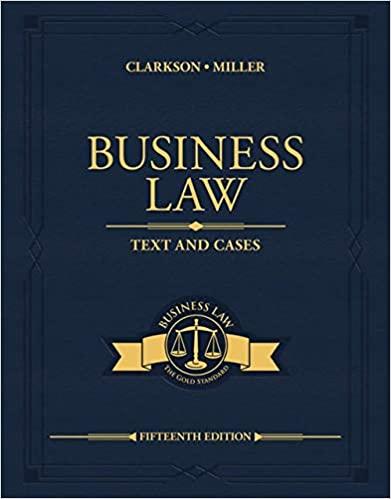Question
Exercise 23 Using the rule of law set out in the Rule Section, please determine whether the commercial described in the fact pattern below was
Exercise 23 Using the rule of law set out in the Rule Section, please determine whether the commercial described in the fact pattern below was a valid offer.
Rule Section New York law provides the following: It is quite possible to make a definite and operative offer to buy or sell goods by advertisement, in a newspaper, by a handbill, a catalog or circular or on a placard in a store window. It is not customary to do this, however, and the presumption is the other way ... Such advertisements are understood to be mere requests to consider and examine and negotiate; and no one can reasonably regard them as otherwise unless the circumstances are exceptional and the words used are very plain and clear. The exception to the rule that advertisements do not create any power of acceptance in potential offerees is where the advertisement is clear, definite, and explicit, and leaves nothing open for negotiation. In that circumstance, it constitutes an offer, acceptance of which will complete the contract. Further, a statement that is clearly a joke does not give rise to a contract; if the statement is not clearly a joke, the question is whether a reasonable person would consider the statement to be a joke rather than a serious offer.
Fact Pattern
Cheryl Townsend ("Townsend") was the new owner of Deluxe Nails, a thriving nail salon in New York City. Under its previous owner, the salon had grown to be a local institution. Women gathered there not just for nail care, but for conversation over coffee and the welcoming environment. When Townsend took over, she wanted to put her own mark on the salon. She immediately renamed it Celebrity Nails and painted the store bright pink, instead of the previous light beige. She was delighted to own such a popular business, and for about three months, she happily took in the considerable profit that the salon produced. Townsend made other changes in addition to the salon's name. She lowered the manicurists' hourly wage, and she removed the flex-time options that had previously been available. The manicurists were unhappy with the changes, and several of the most popular manicurists left. Townsend ended the practice of offering complimentary coffee or bottled water. "Too expensive!" she remarked to a customer who complained. After a few more months of Townsend's ownership, business started to slump. Townsend reinstated the free coffee and bottled water, but still the customers stayed away. Townsend decided to take steps to increase business. She thought for several days about a promotion that would really create a splash. "I've got it!" she finally decided. She put together the advertising campaign and launched it on January 1st. The campaign consisted of a television commercial, billboard, and flyer posted on the salon's door. In the TV commercial, an announcer dressed as Lady Gaga spoke straight into the camera: "If you want nails like a celebrity, come to Celebrity Nails. Come to the salon once, and you'll have nails like me. Come three times, and you'll be more glamorous than ever before. Come ten times, and you'll have a record contract! It worked for me!" The commercial then showed the faux Lady Gaga excitedly signing a contract, throwing the pen over her shoulder, winking, and then showing nails with glitter all over them. "It's all in the nails, baby," she said to the camera with a pout, as the shot faded and the address of Celebrity Nails appeared on the screen. At the bottom, large words appeared in pink letters: "Free celebrity glitter with every manicure!" The commercial was a hit, and soon business increased. Customers loved the new faux Lady Gaga commercial, and many customers joked about the celebrity lifestyle that their new nails would supposedly bring. "It's all in the nails, baby," they said to one another, holding their nails up with a laugh. Townsend was thrilled with the results of the advertising campaign, and she planned a sequel to the TV commercial. She was taken aback, then, when she was served with a lawsuit one morning. It stated that the customer had been to the nail salon ten times but did not have the promised record contract. The lawsuit alleged that the commercial had effectively set out a promise, and it had not delivered. "Please provide a record contract immediately," the lawsuit read, "or pay $1,000,000 in damages." Townsend gasped. "There's no way I can afford this," she explained to you in your office. "Do I have to deal with this? Can we win?" Townsend asks you to find out whether her commercial really did amount to an enforceable offer to enter into a contract. What do you think? Please use the rule of law above to answer the question.
I.R.A.C Formate
Hill, Cassandra L.; Vukadin, Katherine T.. Legal Analysis: 100 Exercises for Mastery, Practice for Every Law Student, Second Edition (pp. 45-46). Carolina Academic Press. Kindle Edition.
Step by Step Solution
There are 3 Steps involved in it
Step: 1

Get Instant Access to Expert-Tailored Solutions
See step-by-step solutions with expert insights and AI powered tools for academic success
Step: 2

Step: 3

Ace Your Homework with AI
Get the answers you need in no time with our AI-driven, step-by-step assistance
Get Started


